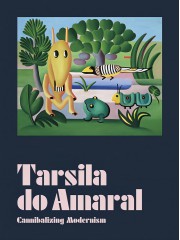
|
Tarsila Do Amaral: Cannibalizing Modernism
PEDROSA; CARNEIRO; SANTORO; RICCIOCOPPO; OLIVA;
MASP
159,00
Esgotado
|
|
This is the most comprehensive exhibition catalog dedicated to the work of Brazilian artist Tarsila do Amaral (1886-1973), a pioneering figure in Latin American modernism. After studying with Fernand Léger (1881-1955) and André Lhote (1885-1962) in Paris, Tarsila, as she is widely known in Brazil, cannibalized modern European references to create a unique style of her own, true to her origins, with the use of caipira [Brazilian countryside] colors, as well as representations of typical and local characters, scenes, and narratives. Much of her work was made in dialogue with two leading modernist thinkers of her time: Mário de Andrade (1893-1945) and Oswald de Andrade (1890-1954). Her work also parallels the development o Oswald de Andrade's antropofagia, a key concept in twentieth-century Latin American thought, a poetic program through which intellectuals of the tropics would cannibalize European cultural references in order to metabolize and produce something singular and hybrid of their own, while also bringing indigenous, Afro-Atlantic, and local elements into their work. This publication accompanies the most extensive exhibition of Tarsila to date, held at the Museu de Arte de São Paulo (MASP), and reproduces 113 of her works, as well as documents and photographs. Edited by MASP's Adriano Pedrosa and Fernando Oliva, it features newly commissioned essays by Adriano Pedrosa, Amanda Carneiro, Fernando Oliva, Irene V. Small, Mari Rodríguez Binnie, Maria Bernardete Ramos Flores, Maria Castro, Michele Greet, Michele Bete Petry and Renata Bittencourt, historical texts by Paulo Herkenhoff and Sergio Miceli, and commentaries on Tarsila's works by Artur Santoro, Carlos Eduardo Riccioppo, Guilherme Giufrida, and Matheus de Andrade.
|
|
|